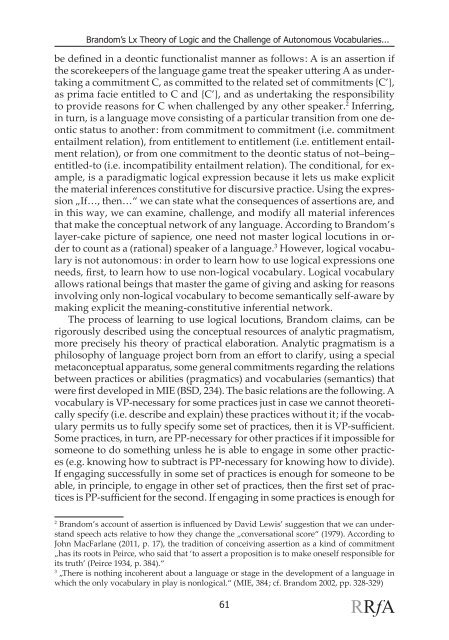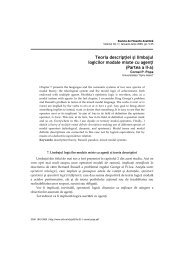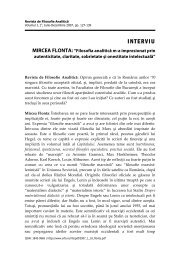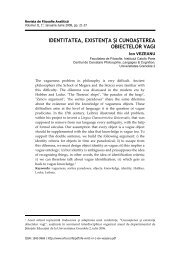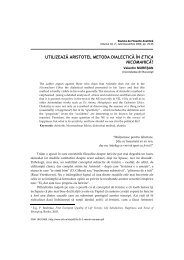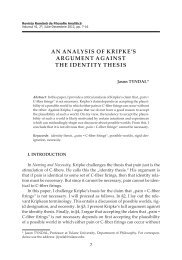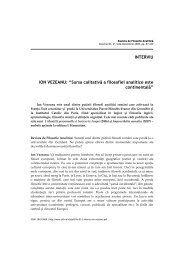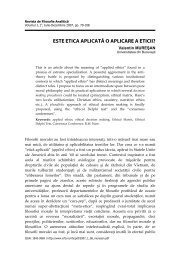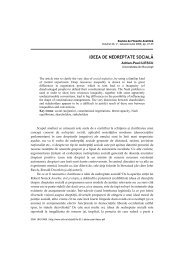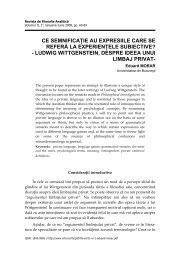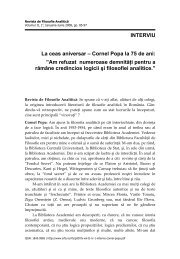brandom's lx theory of logic and the challenge of autonomous ...
brandom's lx theory of logic and the challenge of autonomous ...
brandom's lx theory of logic and the challenge of autonomous ...
You also want an ePaper? Increase the reach of your titles
YUMPU automatically turns print PDFs into web optimized ePapers that Google loves.
Br<strong>and</strong>om’s Lx Theory <strong>of</strong> Logic <strong>and</strong> <strong>the</strong> Challenge <strong>of</strong> Autonomous Vocabularies...<br />
be defined in a deontic functionalist manner as follows : A is an assertion if<br />
<strong>the</strong> scorekeepers <strong>of</strong> <strong>the</strong> language game treat <strong>the</strong> speaker uttering A as undertaking<br />
a commitment C, as committed to <strong>the</strong> related set <strong>of</strong> commitments {C’},<br />
as prima facie entitled to C <strong>and</strong> {C’}, <strong>and</strong> as undertaking <strong>the</strong> responsibility<br />
to provide reasons for C when <strong>challenge</strong>d by any o<strong>the</strong>r speaker. 2 Inferring,<br />
in turn, is a language move consisting <strong>of</strong> a particular transition from one deontic<br />
status to ano<strong>the</strong>r : from commitment to commitment (i.e. commitment<br />
entailment relation), from entitlement to entitlement (i.e. entitlement entailment<br />
relation), or from one commitment to <strong>the</strong> deontic status <strong>of</strong> not–being–<br />
entitled-to (i.e. incompatibility entailment relation). The conditional, for example,<br />
is a paradigmatic <strong>logic</strong>al expression because it lets us make explicit<br />
<strong>the</strong> material inferences constitutive for discursive practice. Using <strong>the</strong> expression<br />
„If…, <strong>the</strong>n…“ we can state what <strong>the</strong> consequences <strong>of</strong> assertions are, <strong>and</strong><br />
in this way, we can examine, <strong>challenge</strong>, <strong>and</strong> modify all material inferences<br />
that make <strong>the</strong> conceptual network <strong>of</strong> any language. According to Br<strong>and</strong>om’s<br />
layer-cake picture <strong>of</strong> sapience, one need not master <strong>logic</strong>al locutions in order<br />
to count as a (rational) speaker <strong>of</strong> a language. 3 However, <strong>logic</strong>al vocabulary<br />
is not <strong>autonomous</strong> : in order to learn how to use <strong>logic</strong>al expressions one<br />
needs, first, to learn how to use non-<strong>logic</strong>al vocabulary. Logical vocabulary<br />
allows rational beings that master <strong>the</strong> game <strong>of</strong> giving <strong>and</strong> asking for reasons<br />
involving only non-<strong>logic</strong>al vocabulary to become semantically self-aware by<br />
making explicit <strong>the</strong> meaning-constitutive inferential network.<br />
The process <strong>of</strong> learning to use <strong>logic</strong>al locutions, Br<strong>and</strong>om claims, can be<br />
rigorously described using <strong>the</strong> conceptual resources <strong>of</strong> analytic pragmatism,<br />
more precisely his <strong><strong>the</strong>ory</strong> <strong>of</strong> practical elaboration. Analytic pragmatism is a<br />
philosophy <strong>of</strong> language project born from an effort to clarify, using a special<br />
metaconceptual apparatus, some general commitments regarding <strong>the</strong> relations<br />
between practices or abilities (pragmatics) <strong>and</strong> vocabularies (semantics) that<br />
were first developed in MIE (BSD, 234). The basic relations are <strong>the</strong> following. A<br />
vocabulary is VP-necessary for some practices just in case we cannot <strong>the</strong>oretically<br />
specify (i.e. describe <strong>and</strong> explain) <strong>the</strong>se practices without it ; if <strong>the</strong> vocabulary<br />
permits us to fully specify some set <strong>of</strong> practices, <strong>the</strong>n it is VP-sufficient.<br />
Some practices, in turn, are PP-necessary for o<strong>the</strong>r practices if it impossible for<br />
someone to do something unless he is able to engage in some o<strong>the</strong>r practices<br />
(e.g. knowing how to subtract is PP-necessary for knowing how to divide).<br />
If engaging successfully in some set <strong>of</strong> practices is enough for someone to be<br />
able, in principle, to engage in o<strong>the</strong>r set <strong>of</strong> practices, <strong>the</strong>n <strong>the</strong> first set <strong>of</strong> practices<br />
is PP-sufficient for <strong>the</strong> second. If engaging in some practices is enough for<br />
2<br />
Br<strong>and</strong>om’s account <strong>of</strong> assertion is influenced by David Lewis’ suggestion that we can underst<strong>and</strong><br />
speech acts relative to how <strong>the</strong>y change <strong>the</strong> „conversational score“ (1979). According to<br />
John MacFarlane (2011, p. 17), <strong>the</strong> tradition <strong>of</strong> conceiving assertion as a kind <strong>of</strong> commitment<br />
„has its roots in Peirce, who said that ‘to assert a proposition is to make oneself responsible for<br />
its truth’ (Peirce 1934, p. 384).“<br />
3<br />
„There is nothing incoherent about a language or stage in <strong>the</strong> development <strong>of</strong> a language in<br />
which <strong>the</strong> only vocabulary in play is non<strong>logic</strong>al.“ (MIE, 384 ; cf. Br<strong>and</strong>om 2002, pp. 328-329)<br />
61


